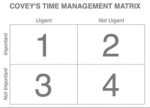Spring is in the air and now is the perfect time to do some spring cleaning and organizing with your own business. So, to help your business organize, prioritize, plan and set up in the most efficient way, I have once again looked to the CarolRoth.com contributor network of business owners, experts, advisors and entrepreneurs to provide their best advice. Their answers are presented below in no particular order.
You may notice some similar ideas listed, but I kept them separate, as something in the way one is framed may resonate differently with you.

1. Revenue, Then Prioritize
We prioritize tasks in the following order:
1. What will increase revenue immediately or cut costs immediately?
2. What fixes a technical “bug” or problem that might be causing us to lose customers?
3. What will cause more interest in our company (new features, partnership outreach, etc.)?
Simply put:
1. Earn money
2. Fix problems
3. Increase customers

2. Easy Tips to Organize
As simple as it sounds, the best way to get organized is to make a decision on every piece of paper that comes into your office and on every email that comes into your box. You'd be surprised at how organized that will make you and how much time you will save.

3. There's No Foolproof Plan
Getting organized in business takes trial and error. Many people try to set systems in stone or follow someone else's foolproof plan. It's great to start there and then, tweak what doesn't make work easier for you. This will save you hours of time, countless headaches, and likely thousands of dollars.

4. Make Time to Get Organized
My tip to getting organized is make time to get organized! Every Monday before the week kicks off, I give myself a solid hour to sit and literally plan out my week. I start at each day and then, dissect that work day into areas of focus: sales team, accounting, marketing, etc. In doing so, my business is organized top to bottom and I know what will happen, what I will be getting taken care of and how my business will grow.

5. 3 Time Management Keys
Entrepreneurs need excellent time management.
-Remove all potential distractions.
It can be tempting to turn on the television instead of perfecting a business plan, so hide the remote.
-Take breaks.
Time management guru Marc Guberti says, "Consistently doing too much work at one time will lead to a decline in quality." Unplug occasionally.
-Focus when you are working.
Crush the Turtle from Finding Nemo once said, "Focus, dude!" Be your own time management advocate, not adversary.

6. Save Time with a Password Tool
From our experience working with small business owners, we repeatedly witness individuals wasting tremendous amounts of time looking for login credentials, whether it be for their internal systems, websites, subscriptions, etc. I strongly recommend that entrepreneurs invest time in utilizing a secure tool to track and organize their passwords. We recommend KeePass, an open source password manager which uses an encrypted database to store passwords in one consolidated and organized location.

7. Copies are Crucial!
I love trees, but copies are crucial! If a document, letter or email is important, I do as follows:
1) Make several copies of it and file them in a few different places, just in case I can't remember where it was originally filed.
2) If I know I need to take something with me, I put it in my car the night before, so it's not forgotten the next day.
3) If there's something that I can’t afford to lose should my computer crash and never recover, I make sure to print and file it, so I have peace of mind.

8. Make a List!
My best advice to stay organized is lists, lists, and lists! Either on a calendar or notepad, write a list of the tasks that you need to accomplish with the most important and difficult tasks first. This way, they will be off of your mind and cause less stress.

9. Zirtual Saves Time
Zirtual is a life saver! I use them for the tasks that I don't have time to do or the tasks that need to be done and don't rely on a specific level of expertise. For example, I use Zirtual (virtual assistant) for research, copy editing, scheduling and managing my calendar. I use Zirtual to stay on top of what's a priority on my to-do list. Delegating is an important part of running a successful business and every entrepreneur needs to learn how to share the work.
Thanks to: Michelle Regner, CEO of
Near Me.

10. Manage Energy, Not Time
Manage your energy, rather than time, to be more efficient and accomplish more. Eliminate things and people in your life that drain you. Focus on what energizes you.
Understand your energy cycles; when is your energy highest? When does your energy dip? Plan your day around your energy cycles. Mine is highest in the morning and late afternoon, so that’s when I do my coaching calls or things that require the most thought or creativity.
Manage your energy to be more organized and effective.

11. Begin With the End in Mind
Small business owners who fail to plan, plan to fail, but it doesn't have to be this way. In the infancy of a business, entrepreneurs should start with the end in mind when organizing their business. In other words, what kind of leader do business owners see themselves being leading their company, the vision they have for their business in the short run & in the out years. Mindset is the key to being organized and owners must be determined to provide clients exceptional products and services.

12. Use Interactive Lists!
We work as a small close knit team. As a startup company, it is important that we plan and prioritize our work so everything gets completed in the most efficient way. We use the Trello website to create interactive lists we can all update and modify to help organize our 'to do' lists. We can assign individuals to each task and arrange them in terms of priority to get the most important things done first. Visual mood boards and wall charts are also useful.

13. Document Management
Document management software can put important documents at your fingertips in seconds and help you keep everything organized. When you’re running a business, it’s handy to be able to make changes to electronic documents on the fly and transform printed pages into editable electronic files. If you choose a paperless office solution that fully embraces a universal format such as PDF, you’ll have these capabilities and more – including standard form tools.

14. The Take Away
The best tip for helping an entrepreneur get organized is to take away their voicemail and email. Entrepreneurs, by nature, are quick starts and easily distracted. What makes them great at being innovative, taking risks and improvising – all necessary for a successful business – can create a huge, unorganized mess of a business. Voicemails and emails become bottlenecks causing client complaints, massive amounts of wasted and lost time and revenue. Having an assistant review and handle it helps.

15. Stay on Track with Post-Its!
Write every task down on a Post-It note in order of importance and check it off as you finish it, then pull the note free from the stack when you're done for the day and start a new one for the next day. This helps keep better track of what is completed day by day, as well as helps you stay focused on what needs to be done without falling far behind.

16. Organization Tool
The one tool everyone in our office uses to collaborate and stay organized is Trello. We use it to manage our feature request list, our individual weekly to-do lists, and our "we'll get to it someday" wish list. It is really great because you can add checklists, links, and documents. They also have a really great phone app, so we can access it anywhere and get notifications when someone else adds something or makes a change.

17. Keep Informed & Motivate Staff
Use automation and self service processes as much as possible to reduce the chances for human error and to stay informed on what's going on in your organization. Relying on others to send you information that could be automated will eventually lead to them only sending you good news and hiding anything which may cause a stressful situation. This also frees up your staff to be more productive, rather than performing menial unmotivated manual tasks.
Thanks to: Abdul Jaludi of
TAG-MC.

18. Be Strategic!
The best organizational tip for entrepreneurs starting a business: set a strategy. Define the work you will do and the work you won't. Define what your unique (heavy emphasis on unique) competitive advantage is. Say where you will be when. Be intentional. Then, live it in a fashion that the entire organization knows it, so everyone is moving in the same direction, towards the same goal. Without that, everything else is haphazard and by chance.

19. Getting Organized!
I own a financial planning firm with 4 other partners, so it's sometimes a challenge to stay on the same page. That said, we've employed Asana--a project management and collaboration app. It's free under 15 users and is a great way to track projects, tasks, and keep one another accountable. You're also able to upload files so that we can collaborate on a single file and save a million emails from flying around the office. There's far fewer communication drops and it is far easier to stay focused & aligned!

20. First Things First
Best Advice Ever:
Step 1) Each day, list the most important things to accomplish, order according to importance.
Step 2) First things first, second things never. These two steps give you a laser-like focus.
Also, spend 15 minutes with yourself considering events of the day; write out those thoughts in a journal. During that time, make digital copies of things, put them in accurately named files, and throw it up in Google Drive. Guaranteed that this will help you stay focused and organized.

21. Utilize Technology!
Utilize technology and organization apps to help stay organized. Scan personal documents and store in My Documents and in the cloud so you can go paperless. Use business apps such as: Camcard to upload business cards into My Contacts; Evernote Web Clipper to snip and store articles in the cloud and accessible on any device; Pocket to send content, videos etc to store and read later; & NetReceipts for filing receipts, expense reports and much more.

22. Organize Like a Franchise!
Ongoing growth of your business will depend on how well you can duplicate your initial success.
When you franchise, the law says you must give your franchisees a manual showing them how to start up (construction, design, and pre-opening marketing) and then, continue their operations (financial, staffing, ongoing marketing, supplying, and your tips for successful operation).
Start now to outline each of these basic functions for your business growth!

23. Get it Out of Your Head
The most successful business owners are able to take all of the knowledge that they have in their head and get it written down so that others can take action. Think through every single activity that you do in your business. Write down step-by-step what's done to accomplish that activity. Streamline and automate where possible, then identify the next activity. This allows for consistent handling of business processes and easy delegation. It also increases the value of your business.

24. Do What's Right for You
As a new business, you will feel pulled in multiple directions. Prioritize your time by what's most time-sensitive, impactful and aligns to your goals. Measure activities to see how they impact macro and micro metrics. If your skills are lacking in a business aspect, delegate to a team member or hire a partner so you can focus your energy on the right projects. Finally, don't do something because "that's what everyone else does". You know your business best; do what's right for you.
Thanks to: Erica Riegelman of
aftcra.

25. Time Management via the Matrix
As a long-time entrepreneur (6 companies over 15 years), I’ve had to learn a variety of methods to get organized and prioritize. One of the most powerful prioritization tools I use is Covey’s Time Management Matrix. It is simple, yet quite effective at helping you focus on what matters to managing your business. I have relied in this and similar methodologies to weed out responsibilities, deliverables and action items that do not move my business forward, yet take a good deal of my time.

26. Are You Open for Business?
To help get organized, have a mini meeting with yourself at the onset of every working day.
Start by recommitting yourself to being "Open for Business". Then, take a look at your calendar and determine what has to be done, what you want to do and what you can do.
Ask yourself "If I do this (fill in the blank) will it help my bottom line?" Then, "What must I do today to help me move closer to my goals?" Then, get to it and make the most of your day.

27. Block Schedule to Meet Goals
Organize your & employees time. Identify goals, define & assign tasks to meet those goals, prioritize, & then create workable schedules.
Block out hours each day to work on goal-oriented tasks & business maintenance tasks. Have 6 priorities daily. Make sure to schedule breaks & take time to relax between blocks!
Calendar it on all your computers & smart phones. Print it & post it where it's a visible reminder to stay on track, & set up alarms to remind you when the next block is starting.

28. Quick Tips for Entrepreneurs!
Outsource functions that you do not need to do. Focus on functions that dictate your competitive advantage. Write a daily "To Do" list. Prioritize the list using the following method: It's an "A" priority if (urgent, "what happens if I didn't do this today?); It's a "B" priority if (it doesn't meet the "A" criteria); It's a "C" priority if (not important). Work on one task until it is completed. Make "personal time" an "A" priority every day. Learn how to say "no" to favors that impede progress.

29. SWOT Analysis of the Business
Business owners do have business/strategic plans, they just exist in their heads. They don't want to take the time to write them out on paper.
The solution is a SWOT analysis performed by key employees. It's easy, simple, and has bullet points.
It is required that the SWOT analysis is reviewed the first week of each quarter. If the management doesn't develop this habit, they will go back to their old habits and never continuously improve the business in a structured manner.

30. Centralized Info in Database
The one tip we would offer for business owners and entrepreneurs to keep their business organized is to centralize the data they have as much as possible. Having data everywhere - on paper, on a few different computers, especially in separate excel sheets - gets out of hand very quickly. We centralize our own data with our flexible cloud database product and it's possible to work from anywhere. This way, we don't have to rely on office computers or worry that something might happen to our data.
Thanks to: Berrin Sun of
Ragic.

31. Systemize Your Business
Systemize every action within your business. Systems create order, eliminate chaos and automate everything from administration to quality control. Your first step should be to determine if your current systems are efficient. If not, overhaul the system and recreate it. Once all of your systems are proven and tested, start documenting every single one of them. This is a time-consuming process, but your business will never be the same after the process takes place.

32. Don't Check Email First
The main way I've seen entrepreneurs waste time is on email. When you come into the office, DO NOT CHECK EMAIL FIRST. Get some things done and off your list.
Schedule one half hour, twice a day for emails. If you have clients who get upset when you don't reply to them ASAP, they may not be a good client, and you may need to fire them. Or you may just need to tell them that there's no such thing as an urgent email. If it's an emergency, they should call your phone instead.

33. Get the Writing on the Wall
Seeing is believing! Develop & execute a strategy (white or black)board. This used to be a staple of the traditional office environment, but as we have begun to "live online" it has all but vanished. Create a board and load it with tasks, plans, ideas and more, then place it in a high traffic area. This way, you can organically develop and organize your ideas while opening everything to “group think”. You'll be surprised what resurrecting this concept can do for business organization!

34. Organized Entrepreneurs
Creating a prioritized to-do list for the day is the best way to stay organized. Really focus on the top half of the list and successfully complete it. To do lists create a plan, which will make an entrepreneur and their business more organized and time efficient.

35. Automate Those Biz Functions
Automate as many business functions as you can, with the least amount of software solutions (preferably one or two solutions at the most). Operating your business manually is costly, time consuming and prone to errors. But randomly picking up different solutions for each of your departments is not the answer either, as you will need to integrate them, learn different systems, and manage multiple licenses. You can get the best of both worlds by implementing a single comprehensive solution.
Thanks to: Mike Salem of
Vorex.

36. Foolproof Time Management Tool
Lately, I've fallen in love with the Pomodoro Technique. It is a time management technique that has you work in uninterrupted 25 minute segments with 5 minute breaks in between. I have never been more productive, as I feel like I can do anything for 25 minutes and the breaks ensure I keep a steady rhythm to prevent brain fry. It's free and requires no reading or learning. That being said, I do rely heavily on a $1.99 Pomodoro timer, easily found in the app store. www.pomodorotechnique.com

37. Organizing to Outsource
I knew ahead of time that I was going to outsource my business to my virtual assistant (VA) team, so I planned my organization around that. To set it in motion, I started by investing in a lot of training, time, and supervision to teach my workers the skills they need to run my business. Each VA has a set of skills that allows them to work individually and as a team. This allows them to self-organize around projects and each person knows their role in the operation chain from start to finish.

38. Small Enough to Fail!
Startups are small enough to fail. Everyone wants to be too big too fast. But big is costly: heat, air conditioning, inventory, employees, trade fixtures, commercial property taxes and insurance premiums. Sometimes, when organizing, it is best to manage your growth so that you do not implode, from the inside out. Small businesses must fix their costs or ordinary operating expenses will erode profits. Buy a commercial property and get your relatives to volunteer until your "family owned" business is profitable.

39. You Know Your Business
When selecting tools and applications, focus on finding the "system" that works for you and your business. You know your business better than the person that wrote that 'Top 10 Business Tools' list, your friends, colleagues, Quora and Product Hunt. So, before taking to Google, spend 20 minutes writing down your requirements, agree on them with colleagues where appropriate, and find the first solution that effectively resolves just those things. Then, get back to running your business.
Thanks to: Stuart Brameld of
SUB50.

40. The POS Guide to Organization
I would wholeheartedly recommend a good POS system. A lot of people think of a POS for its literal term, a point of sale system. We're really at point in the industry when companies can offer us much more than just a way to accept payment from customers. A good POS can offer inventory tracking, payroll, real-time analytics, mix-and-match pricing, or another custom tool for your business. But, most importantly, it provides us simplified communication.

41. Attract your Perfect Customer
As an entrepreneur, your sole purpose is to serve clients to utmost satisfaction while making profits and this is only possible when you recognize the Wheat (your perfect customer who aligns with your business goals, needs your services and is willing to pay what you deserve) from the Chaff (customers who don't fit your goals).
Achieving this feat alone gives you clarity as to organizing, planning and prioritizing in your business, because you operate in a ready market who wants what you have.

42. Prioritize -ABC Doesn't Work!
Prioritizing your work is a necessity. The only way to prioritize that works is to prioritize by due date. This forces you to be realistic about what you can accomplish. You have to compare everything on your list and prioritize it in a relative way, as compared to everything else on your list. This helps you to take a long (and sometimes overwhelming) list and focus only on the most critical things for that day, while still being in complete control over everything else on your list.

43. Work Smarter, Not Harder
If you deal with a huge catalog of products, you may get quickly overwhelmed by the task of managing this data. I've found that it's smart to hire a third party data service. Most industries have companies that work with manufacturers to compile & update product data often, which you can use as a foundation and then individualize where you can. Regardless of industry, it's generally worth it to invest in tools & services that increase efficiency, because it ultimately saves you money in the end.

44. Organizing Success
The largest part to organizing a successful business is recognizing what you need to do yourself and what and to who should be outsourced for efficiency. Organization is not just about how to manage your own time, but also how to manage the time of those you contract and employ. This will never work to its ultimate efficiency at first, but rather only after coming to know the strengths and weaknesses of those that work for you.

45. Robust Systems Save You $$$s
When I started, I invested in the best possible system for sales order processing, which saved me members of staff, ultimately saving me money. It meant we could track everything and everything was transparent. If someone was off, you could pick up where they left off. It helps make sure problem orders are so low - less than 1%, rather than 3-4% like some of our competitors. Recently, we’ve moved to a cloud based solution, combining three pieces of software, so everything is far more integrated.

46. How to Limit Interruptions
I specialize in helping busy entrepreneurs and professionals become more productive with their time. One of the most constructive tips I give them is aimed at limiting distractions to keep them focused on the task at hand. I suggest scheduling a time each day to return emails and phone calls. If a client calls outside of this time, allow them to leave a message so you can focus on your work without being interrupted.

47. Time is at a Premium
There are never enough hours in the day to get everything you want accomplished. Consider meetings, which we all need, but also hate because of the sheer potential for waste.
My rule for day-to-day tactical meetings is to limit them to 25 minutes. And enforce it.
This is just the right amount of time to provide some quick background, brainstorm and come up with some tangible next steps. Once your team knows this rule, they’ll come more prepared to cut to the heart of the matter quickly.

48. Separate, Hire, Record, Track
1. Keep your business and personal expenses separate and independent. 2. Hire a professional to handle your accounting and business finances. 3. Make time to record your weekly attributions. 4. Track, track, track your spending.

49. Plan, Plan, Plan
Take 15 minutes after each planning session to distill ideas into "actionable tasks" while they are still fresh. Priorities change all the time! Capture requirements, goal(s), and any relevant documents, notes, or web links- everything you (or an employee) will need to know if you pick the task up 3 months from now. Getting things "out of your head" will reduce your stress and this small investment in up-front planning will pay off x10 in time saved "getting back up to speed".
Thanks to: James Shkolnik of
Rentobo.

50. Accept the 95% Rule
Remember that nothing will be perfect, but strive for perfection. If you keep growing at a 90% rate that is 90% correct, you will get a lot farther than someone who makes sure everything is 100% perfect. Resolve to accept the 95% rule: it will never be perfect, so move on and then circle back later. In short: don't get stuck! Aim high, write down your goals and to-do tasks, move fast on the goals, make a solid game plan for each goal, have the end results very clearly defined, and implement.

51. Organizing Business Clutter
The most important part of being organized is having everything in the proper place. This starts with a principle or grand design. In business, it’s having clear strategy through a business plan. This tells what to do and how the pieces fit together. Planning develops actionable steps that keep a team tracking towards your vision, performance and financial goals. Management reiterates its vision, forms key talking points of the business plan and infuses them into the consciousness of employees.

52. Wall Writing Unlocks Your Mind
Too many to-do's swirling around in your head? Enter ideapaint.com. Not a paint at all, this coating goes over your wall and acts as a giant White Board. I use it when I get overwhelmed or overloaded with ideas or tasks. "Spilling my brain out" on the wall releases me of the "monkey mind" that stops us from being our best selves. Just walk up to the wall, grab a marker, and start writing. When you feel relief, grab a new marker in a different color to circle and prioritize. Control returns.

53. Quick Paperless Tips & Tricks
-- Make your business completely paperless by scanning important documents into searchable PDF files.
-- Use organization software like those packaged with a ScanSnap to file documents away so you can save time on organization and focus on doing what you do best.
-- Use a note taking application like Evernote to archive important documents and ease accessibility and sharing across all of your devices.

54. Just Relinquish Control
I've run into many organizational issues with my start-up. Don't believe me? Ask the customers who showed up for their orders and I didn't have it… I realized that efficiency = relinquishing control and delegating. So, I pitched the idea of being my virtual assistant to my friends and they agreed to work pro bono in exchange for showing them how to create a business as virtual assistants. I haven't missed an order since. Problem Solved.

55. The Customer's Shoes
Step into the target customer's shoes and do everything backwards from the perspective of their experience. BEST TIP for organizing. Hands down. This can help you determine products, pricing, processes, operations and more.
Thanks to: Carisa Miklusak of
tMedia.
Do you know another tip for helping businesses get organized that wasn’t included? If you do, please share it below. And as always, many thanks to everyone that contributed to this article!




















































